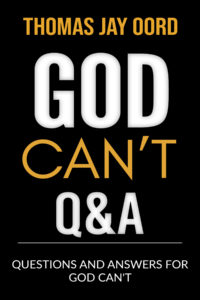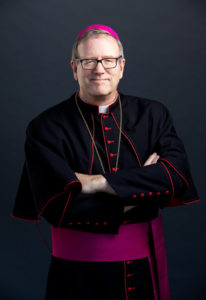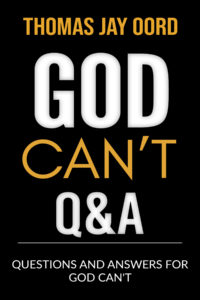God is One Cause Among Others
Did God create you? Or your parents?
I’ve just completed a new book called, Questions and Answers for God Can’t. As the title suggests, it answers questions many readers had after reading my best-selling book, God Can’t.
The new book offers whole chapters devoted to eight questions. Topics include prayer, miracles, eschatology, creation, love, Jesus, and more.
One chapter explores what it means to say “God acts.” This blog essay is an excerpt. So…
GOD AND YOUR PARENTS
Did God create you, or did your parents?
The best answer to these two questions is “yes.”
I don’t mean it’s a paradox. I mean creating involves multiple causes. In this example, your parents couldn’t create you without God’s action. But an uncontrolling God can’t create you without your parents’ actions.
It takes (at least) two, baby!
The idea our lives required both divine and creaturely causation may seem obvious. But some theologians reject it. They worry this makes God “one cause among many,” to use their expression.
BISHOP BARRON SAYS GOD IS NOT ONE CAUSE AMONG OTHERS
Bishop Robert Barron raised this worry during the 2020 Coronavirus pandemic. He was responding to New York Governor Andrew Cuomo, who said humans, not God, stopped the virus from spreading.
“Underlying [his statement),” said Barron, “is the view God is one competitive cause among others. [Cuomo thinks] there’s all the causality we affect in the world. But alongside that, there’s the fussy intervening causality of God. [I believe] God is not one fussy cause among many.”
Much of what Barron says in his several minute response fits the uncontrolling love view. He says, for instance, God and humans worked to combat the virus. He rejects the idea of God intervening, and he says God enables humans to act. But unlike Barron, the uncontrolling love perspective believes God is one cause among many.
What Barron thinks at stake when saying God is “one cause among many” emerges when he recommends how we should think about overcoming the Coronavirus. We should say, “We did it,” he says, “and God has everything to do with it.”
“We should say in regard to this and anything else,” says Barron, “‘Oh Lord, it was you who has accomplished all that we have done.’”[i]
YOU DID ALL WE HAVE DONE?
“You did all we have done?” What’s going on?
Saying God is not one cause among many leads to confusion. This claim makes it impossible to know whom we should praise or blame. To say God “accomplished all that we have done” sounds like God acted as a sufficient cause.
It makes no sense to say God did it all and creatures did some.
Imagine saying, “She did it all, but I helped.” If you helped, she didn’t do it all. There were multiple causes: your causation alongside hers.
The problem with saying “God isn’t one cause among many” remains largely hidden when good things happen. God gets all the credit. “It’s all God,” a diva might say in response to praise and applause. And we might think, “She’s humble, after all.” Giving God all the credit means we get none.
If God is the sole cause of good, however, we are wrong to say, “Thank you,” to those who help. No need to thank the chef; God did it. We should not express gratitude to those who sacrifice for our sake; it was all God. From this view, it’s nonsense to say “Thanks!” to a teacher, medical worker, garbage collector, computer technician, or police officer.
Any good they seemed to have done was, in Barron’s view, fully accomplished by God.
WHEN THINGS GO BAD
The problem with saying, “God is not one cause among many” becomes more obvious when tragedy, abuse, and other evils occur. If, as Bishop Barron says, God “does it all” and “accomplishes everything,” we should blame God for evil.
God did the bad too.
God “does it all but is not one cause among many” is how some theologians weasel out of conceptual conundrums like the problem of evil. “God’s causation isn’t like ours,” is what they’re saying.
That’s just a sophisticated way to play the mystery card. It removes any responsibility from God.[ii]
CONCLUSION
My overall point: we should say God is one cause among others.
God is not an exception to the basic rules of causation. God has unique causal functions, of course. For instance, God provides opportunities to creation. And God is the only causal individual who exists everlastingly. But God can act in these uniquely causal ways as one cause among others.
God and creatures affect what happens in life. When we experience goodness, we should praise God for being its source. But we should also thank creatures who cooperated with God.
When outcomes are evil, we can blame uncooperative creatures, random events, or the conditions of creation. God did not want this evil, and creatures and creation sometimes oppose God’s work for good.
Saying God is one cause among others makes better sense.
I hope you found this excerpt helpful. Please consider getting Questions and Answers for God Can’t. It’s currently in audiobook and ebook. The print version will be published in July 2020.
[i] Bishop Robert Barron, “Bishop Barron Governor Cuomo and the Nature of God https://www.youtube.com/watch?v=IgI29K3DC8w (accessed 5/18/20)
[ii] One of the clearest scholarly advocates for the view I’m rejecting comes from Michael Dodds. See my review of his book, Unlocking Divine Action: Contemporary Science and Thomas Aquinas in Christian Scholar’s Review 43, no. 2 (Winter 2013).




Comments